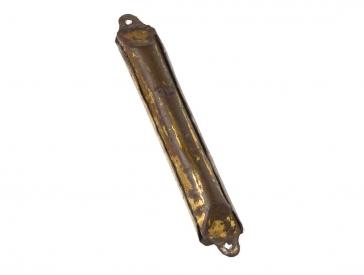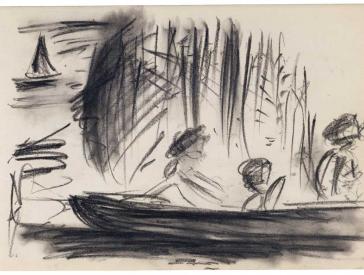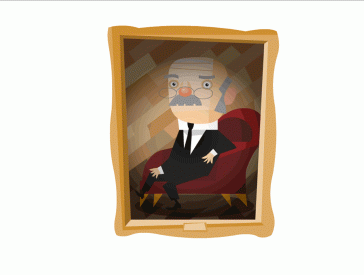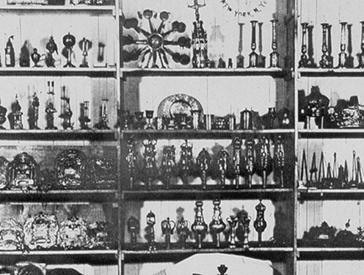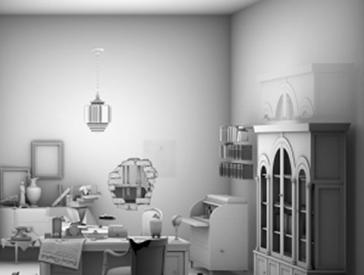Provenance Research
Who owned an object before it became part of a collection? Collectors and museum employees have been asking this question about the origins of the objects in their collections since time immemorial. In the past, having a “good provenance” (or “pedigree”), such as previously being part of a famous collection, has always boosted the value and prestige of artworks and cultural artifacts. Today, research into objects’ previous owners is primarily concerned with clarifying changes of ownership in contexts of injustice, such as under Nazi rule, in colonial contexts, or in the Soviet Occupation Zone and former East Germany. At the Jewish Museum Berlin (JMB), the focus lies on identifying cultural assets that were confiscated in the context of Nazi persecution.
Closely tied to provenance research is the question of restitution, or returning objects to owners and heirs. By signing the Washington Principles, adopted in 1998, the 44 signatory states committed to examining their public collections for items that had been confiscated by the Nazis between 1933 and 1945. Where this is the case, efforts should be made to identify the rightful owners and work with them to achieve a just and fair solution. In 1999, Germany followed this commitment by issuing a Joint Declaration. Because these policy documents were focused on confiscated private property, the scope of the commitment was extended with the Terezin Declaration of 2009 to include looted Judaica and Jewish cultural assets that had been communally owned by Jewish Communities .

As a result of our provenance research project on the collection of paintings and sculptures, Anton von Werner's oil study Das Gastmahl der Familie Mosse (The Mosse Family Banquet) could be restituted to the heirs of the legitimate owner in 2016; Jewish Museum Berlin, photo: Jens Ziehe.
Challenges of a Unique Collection
The museum’s mission is to preserve evidence of Jewish life in Germany – including the heritage of Jews who were persecuted under the Nazi regime. As a result, the JMB collection includes objects that may have been confiscated in this context, although the original owners or their heirs are not always known.
As a Jewish museum, we feel a special duty to those Jews who were persecuted, robbed, and murdered by the Nazi regime, as well as to their descendants. Hence, tracing the origins of these objects and identifying potential heirs to whom they can be restituted is a central task of our provenance research. Since 2015, the JMB has been pursuing this task systematically. In 2023, the museum established a permanent position for provenance research to allow for a comprehensive review of the entire collection.
Contact
Elisabeth Weber
Provenance research
T +49 (0)30 259 93 491
e.weber@jmberlin.de
How We Handle Research Findings
As we unearth research findings, we gradually publish them on our online collections portal (in German). In the case of books, we will also be publishing the findings via the cooperative database Looted Cultural Assets in the future. Whenever find looted objects in our holdings, we actively search for potential heirs and strive to reach just and fair solutions. If the original owners cannot be identified, we register the objects in the Lost Art Database maintained by the German Lost Art Foundation.
Behind the Scenes: Provenance Research at the JMB (4)
Provenance Research in the Painting and Sculpture Collection, 2015–16
Provenance research at the Jewish Museum begin in April 2015 with an investigation of the painting and sculpture collections. One of the outcomes of this two-year project, which was supported by the German Lost Art Foundation, was identifying the provenance of the oil sketch Das Gastmahl der Familie Mosse (The Mosse Family Banquet) by the artist Anton von Werner. In December 2016, the work was restituted to the heirs.
Provenance Research in the Judaica Collection, 2017–19
In another two-year project funded by the German Lost Art Foundation, from 2017 to 2019, the museum investigated the provenance of Jewish ceremonial objects in the collection – including Torah ornaments, Hanukkah lamps, and ritual textiles. One focus of this research was the collection of the Münster Jewish Studies scholar and cantor Zvi Sofer, which was acquired in 1981 for the Jewish Department of the Berlin Museum and is now in the possession of the Jewish Museum Berlin.
We are sincerely grateful to Zvi Sofer’s family, who granted access to his private papers and supported the project from the beginning.
Who was Zvi Sofer?
Zvi Sofer (1911–1980), cantor, and collector, born in Podolia, 1929 Aliyah, academic studies in Vienna, in 1938 re-emigrated to Palestine, from 1959 dedication to the revival of Jewish communities in Germany
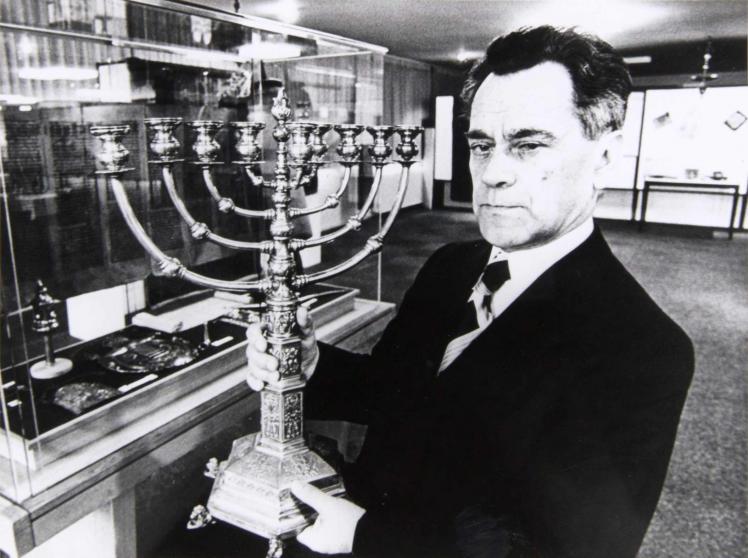
Here Zvi Sofer presents a large Hanukkah menorah from his collection. Photo location uncertain, taken in Lübeck, Duisburg, or Hanover in 1975; bequest of Zvi Sofer, Münster, photographer unknown
Contribution in Provenienz & Forschung
Friedlander, Michal/Augustin, Anna-Carolin: “Provenienzforschung zu Judaica am Jüdischen Museum Berlin,” in: Deutsches Zentrum Kulturgutverluste (ed.): Provenienz & Forschung 2 (2018), pp. 13–19 (to the magazine on the publisher’s homepage).
Download (PDF / 132.19 KB / in German / not accessible)Contribution in Museumsjournal
Augustin, Anna-Carolin: “Von Tora-Schmuck, Chanukka-Leuchtern und rituellen Textilien. Auf der Spur verschlungener Judaica-Biografien,” in: Museumsjournal Berlin & Potsdam 1 (2019), pp. 26–27.
Download (PDF / 49.87 KB / in German / not accessible)

